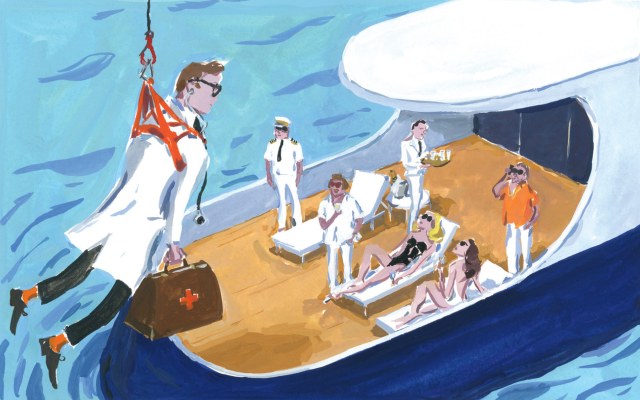

What do you do if you’re diving in the remote Marquesas Islands, in French Polynesia, and are bitten by an impertinent moray eel? If you’re a member of a certain famous—and phenomenally wealthy—family, you connect via secure video link with your on-call medical concierge, who walks you through how to clean the wound and dress it to promote proper drainage (eww!), and locate the correct antibiotic in your handy personal prescription medical kit (designed for convenient jet or yacht stowage). Require evacuation? A detailed plan is already in place.
At WorldClinic, a 19-year-old global concierge telemedicine practice founded by Daniel Carlin, M.D., a former U.S. Navy chief medical officer, dealing with needy plutocrats, tech titans, and household-name celebs is par for the course. (For bigwigs attending events like Davos, Carlin even sends ahead Special Operations Forces–trained medics and a “clinical surveyor” to map out nearby resources and assemble a tactical response team in case of a crisis.)
“We were among the most aggressive first adopters of digital communications and real-time sensor technology in concierge medicine,” Carlin says. “But for the moment, apps and screens are still just important tools. Eighty percent of what we do involves actual listening and caring, two things that are essentially punished by the insurance-based health care system.”
In fact, many people who don’t rely on insurance for their medical needs—and are willing to spend upwards of five figures a year for super-well-connected concierge doctors—value house calls as much for dealing with legitimate emergencies as for the privacy, convenience, and personal touch they provide. “We bring the ER to the patient,” says general practitioner Paul Ettlinger, who founded the London General Practice, a chichi private clinic that offers all manner of health care services and around-the-clock access to royals, media luminaries, and pop stars (we’re talking Adele here). “I’ve never taken a symptom at face value. Someone once called with what they thought was indigestion, and it turned out to be a heart attack.”
Such personalized service can have its perils—but not for the patient. “If you really want to offer a comprehensive service, you mustn’t question why people are calling at 2 a.m.,” Ettlinger continues. He recalls a gentleman who answered the door in a silk negligee, requesting an enema. “I told him I have a nurse who does that.” Still, he remains unfazed. “It’s simple,” he says. “I got into medicine to help people.”
Helping such high-flyers often involves ensuring they can jump the line when they need specialized care; like that hotel concierge who magically produces house seats for Hamilton, a doctor concierge worth his or her fee can quickly set you up with the crème de la crème in whatever area of medical expertise you require. At its best, says Katja A. Van Herle, M.D., the founder of Premier Health Care in Beverly Hills, “directed medicine” is a mixture of old-school doctoring (she even carries a vintage doctor’s valise to house calls) and knowledge of the most cutting-edge protocols. “I will come to you, hold your hand, and set up an ICU in your bedroom if needed. The only time I switched off my phone was on my wedding day, 12 years ago.”
Barney Kenet, M.D., a Manhattan concierge dermatologist, recalls the famous New York designer who had an unfortunate facial during Fashion Week and asked for an emergency consultation at a local Starbucks so that her staff wouldn’t know she was taking a vanity break. He has flown to Martha’s Vineyard to see one of his patients, and sent a courier to Russia to retrieve a rare drug for another. According to Kenet, even high-powered executives are bewildered by health care. “It transcends affluence. No one knows how to navigate the system, unless you’re a doctor or have one in the family.”
Indeed, for all of the recent advances in the medical world (supercomputers like IBM’s Watson are already providing better diagnostics than humans), the strategy for choosing a concierge doctor remains as low-tech as ever. “Word of mouth,” says San Francisco internist Clifford Sewell, who in 1998 founded Discover Health, an exclusive practice that caters to family-oriented Silicon Valley types. “Good news travels quickly in small networks.”
Technology adviser Shannon Getty, who lives in San Francisco with her husband, Peter, and their two children, did extensive research before selecting Sewell’s team. It was important for her to have sophisticated preventative care and a pediatrician on call “for nervous mommy questions in the middle of the night.” She says she won’t go back to a conventional general practice. “I know regular doctors are doing the best they can, but what has happened to our medical system is deplorable,” she says. “I can’t fix it by myself, but I can decide where to put my discretionary income, and what could be a better investment than top-notch health care for my family? I don’t need another outfit.”
Content retrieved from: https://www.wmagazine.com/story/private-medical-concierge-one-percent-medicine-worldclinic.
